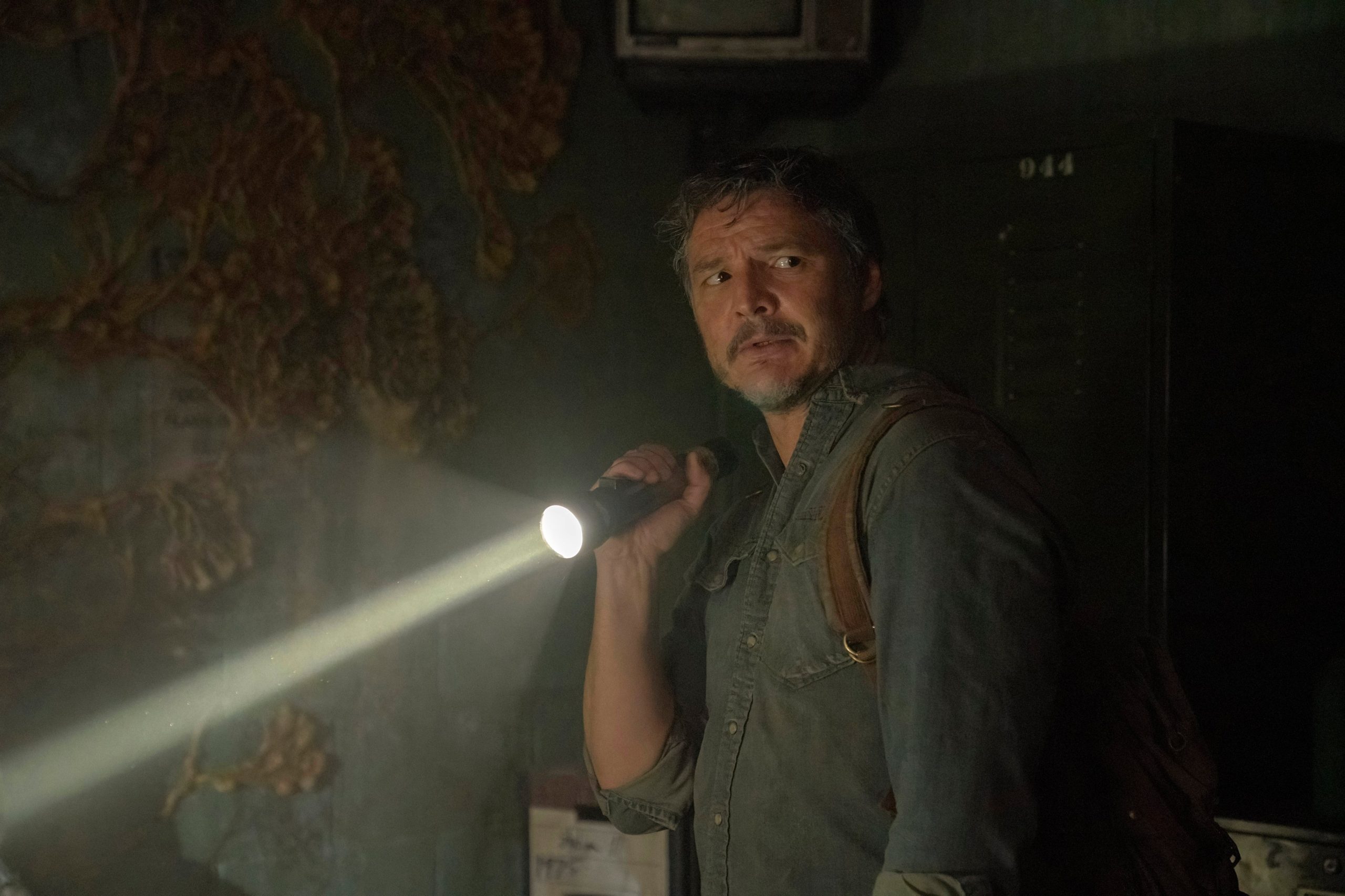
“I’m your Daddy.”
Those playful, throwaway words, cheekily spoken at the camera during a Vanity Fair interview, quickly devolved into lewd memes, thirst tweets, and a general descent into depravity as the internet struggled to keep their cool around Hollywood’s latest “it man”.
Pedro Pascal is the internet’s current idée fixe. The actor first captured our attention as the enigmatic Din Djarin in The Mandalorian and since then, social media has only tightened its grip on Pascal, thanks to his outstanding performance as Joel in The Last of Us. But little of this obsession is born from his acting skills, and instead comes from a more base fixation: his sex appeal.

Credit: HBO
Collective carnality has reduced Pascal’s achievements down so that only his sexuality is worthy of note. The way he wears his glasses, how he smirks at the camera, how rugged his features are – we’re obsessively scrutinising every detail and reading even the most mundane of actions as sensual. The grip of mania is in full swing, unable to disconnect the man from the fantasies openly shared online.
This isn’t a new phenomenon. Audiences have long pined after heartthrobs – like the floppy haired, fresh faced looks of Hugh Grant and Leonardo DiCaprio in the 90s. But the “sex symbols” we now fawn over are far more complex, more online and wrapped up in a sea of colliding subcultures, like BDSM, Kink, and LGBTQIA+.
Take the roles that Pascal plays: men in authority, but also men that are either fathers or assuming a father role. We see this authority and start to connect with the paternal emotions it invokes, but alongside those emotions comes an inherently sexual connotation of “daddy”. Consequently, audiences conflate the two distinct camps of what “daddy” means. Pascal is deprived of control over this narrative as we impose our desires onto him.
Now every Pascal interview is guaranteed to mention the daddy question; it’s become an imposition that Pascal can’t easily escape. If he laughs in response, fans and media alike take it as confirmation they can doubledown on their behaviour – he’s grinning, so he must be enjoying it. As the compulsion to sexualise him grows, any chance of rebuking this enforced narrative diminishes.
It’s a weird landscape to find ourselves traversing, especially when the #MeToo Movement is still marching onward towards equality. Yet, in our quest to highlight the unfair and abusive treatment of women actors, we’ve inadvertently failed to recognise how comfortable we are with sexualising their male counterparts. We don’t ask for consent, or consider the capricious thin line that celebs have to walk in order to win our hearts; just one slip and they can fall into oblivion. We, as fans, have that power and, whether we realise it or not, we’re using it to perpetuate a double standard we’ve apparently fought so hard to vanquish.
When Pascal walked the red carpet at the Disney+ premiere of The Mandalorian season three, he was asked, without forewarning or his consent, to read “thirst tweets” about himself. Pascal politely declined, but the fact that he was expected to assume the sexualised role he’s been assigned by social media, without question, brings to the fore how desensitised we are to the hypersexualisation of male actors.
Little backlash followed the exchange, which in itself only serves to underline the cognitive dissonance at work here. If a woman actor had been placed in a similarly comfortable position, social media would have ignited like a powder keg as tweets about #MeToo resurfaced. There’s a double standard here, though it’s one we perhaps ignore because we feel, however subconsciously, that men should know how it feels to be objectified. Or maybe it’s less poignant than that, perhaps we simply don’t regard the two as being one and the same.
Even if Pascal doesn’t mind being dubbed the “internet’s daddy”, it’s still highly problematic to never question if our infatuation is too much, and has transgressed into something much more sinister.
this is the worst thing I’ve ever seen pic.twitter.com/7npzBOqCxk
— lauren | joel defender (@djarinluck) March 1, 2023
The same fetishisation of Pascal happened to Jamie Campbell Bower, aka Vecna in Stranger Things season 4. Although Bower plays the villain, fans developed a perverse fetishisation of Vecna, sending tweets longing for him to “step on them”. And while Bower, like Pascal, entertained this moniker of daddy, he too shared some uncomfortable moments when reading through the endless onslaught of erotic tweets. In fact, one tweet shocked him so much that he “joked” that the person behind it needed therapy to work through their emotions.
We’re supposed to see these instances as funny, and maybe to begin with they are, but what once was a joke that everyone is in on that morphs into a joke where the actors are the main punchline. Their feelings are unimportant, so long as the masses can devour yet another innuendo or suggestive meme.
As a society, we’re too comfortable with waiting for someone to break down, rather than addressing our actions before they get out of hand. We’re a society of reactive consumers when we should be proactive; like countless women before them, these men are viewed as objects for our personal amusement, stripped of their humanity in the process. Any concern over the damage we might cause only comes after the fact, if and when the actor in question takes a stand. Consideration comes far too late, and is offered begrudgingly, as if those in the spotlight should never complain about the status they’ve been given.
No, these men aren’t necessarily suffering because of these comments (as far as we know), but they shouldn’t have to before we take this brazen sexualisation more seriously. There must come a time when we recognise that some boundaries shouldn’t be overstepped at the expense of someone else, regardless of their status or their relationship to us. The excuse of celebrity, in that they’ve seemingly “given up” their privacy, is a tired fallacy that needs to end.




